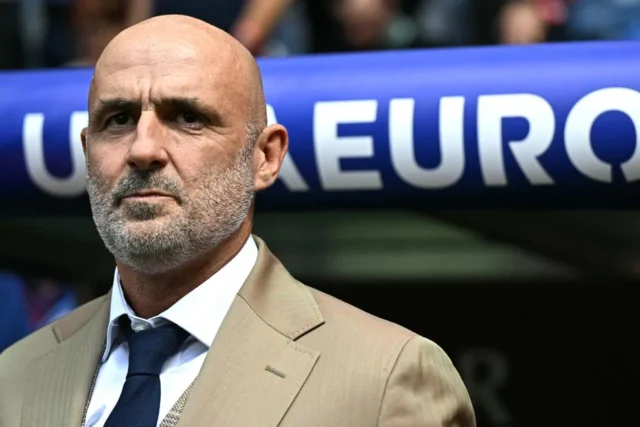Poland vs Austria predictions for this Euro 2024 fixture. Poland and Austria face off at Olympiastadion, Berlin, Friday, needing a win to stay alive in Group D. Read on for our match preview and free betting tips.


European Championship | Group Stage – Jun 21, 2024 at 5pm UK at Olympiastadion Berlin

Don’t have a BetVictor account? Click below to claim this offer👇
Poland vs Austria Predictions
Key Stats
– Austria have averaged 2.1 goals per game in their qualification campaign, reflecting their attacking efficiency.
– Poland’s possession rate of 66.6% highlights their preference for controlled build-up play and maintaining possession.
– Austria’s higher average of 5.3 corners per game compared to Poland’s 6.8 underscores their aggressive offensive strategy.
Can Austria Overcome Poland in Their Crucial Euro 2024 Encounter?
As Poland and Austria prepare to face off at the Olympiastadion in Berlin on Friday evening, both teams are acutely aware that another defeat could severely hamper their chances of progressing from Group D in Euro 2024. Each side is coming off a loss in their opening matches, with Poland narrowly beaten by the Netherlands and Austria edged out by France. This encounter is poised to be a critical juncture in their respective campaigns.
Match Preview
Poland’s match against the Netherlands saw them take an early lead through a well-executed header by Adam Buksa. Despite the absence of their talismanic striker Robert Lewandowski, Poland initially held their own but were eventually undone by a resilient Dutch side. Michal Probierz’s team managed seven shots on target but allowed the Netherlands 21 attempts, showcasing both their offensive capabilities and defensive frailties. The end of Poland’s eight-match unbeaten streak means they need to recalibrate quickly to stay in the competition.
Austria faced a similarly tough challenge against France, where an own goal from Max Wober sealed their fate. Despite this setback, Ralf Rangnick’s team showed determination, keeping the match competitive until the final whistle. Austria had been on a seven-game unbeaten run prior to this match, indicating their potential to bounce back. Historically, matches between Poland and Austria have been closely contested, with their last encounters in 2019 resulting in a narrow win for Poland and a goalless draw.
Offensive and Defensive Strategies
Poland’s strategy under Michal Probierz has focused on a balanced approach, combining solid defence with opportunistic counter-attacks. The team relies heavily on the creative midfield play of Piotr Zielinski and the finishing prowess of strikers like Buksa and Lewandowski, when available. Poland’s defence, anchored by Jan Bednarek and Jakub Kiwior, aims to stay compact and resilient, though they struggled against the Netherlands’ persistent attacks.
Austria, managed by Ralf Rangnick, employ a high-pressing style aimed at disrupting their opponents’ build-up play. Their offensive strategy leverages the versatility of Marcel Sabitzer and the physical presence of Marko Arnautovic. Defensively, Austria are organised and rely on players like Philipp Lienhart and Max Wober to maintain structure and repel attacks. Despite their loss to France, Austria’s defensive unit displayed commendable resilience against one of the tournament’s favourites.
Key Player Performances
In Poland’s ranks, Adam Buksa’s performance against the Netherlands highlighted his aerial prowess and goal-scoring ability. Piotr Zielinski’s midfield orchestration remains vital for Poland’s attacking moves, while Wojciech Szczesny provides stability between the posts.
Austria’s Marcel Sabitzer has been pivotal, contributing significantly both in attack and defence. His ability to control the midfield and link up play is crucial for Austria’s system. Marko Arnautovic, though often a polarising figure, brings experience and a physical edge to Austria’s forward line, making him a constant threat.
Expected Goals Analysis
Expected goals (xG) metrics provide insight into the offensive capabilities of both teams. Poland’s average of 1.5 goals per game indicates their ability to create and convert chances, though their defensive lapses are a concern. Austria, with an average of 2.1 goals per game, show a higher attacking efficiency, reflecting their aggressive playing style and ability to capitalise on scoring opportunities.
Tactical and Performance Comparison
Tactically, Poland and Austria present contrasting styles. Poland’s pragmatic approach focuses on defensive organisation and quick transitions, aiming to exploit spaces left by the opposition. Their possession rate of 66.6% highlights a preference for controlled build-up play, with accurate passing being a key feature.
Austria, with a possession rate of 56.4%, prefer a more direct and high-intensity game. Their higher number of shots on target per game (6.8) compared to Poland’s 4.9 underscores their aggressive attacking philosophy. Defensively, Austria’s robust approach is reflected in their lower goals conceded per game (0.9) compared to Poland’s 1.1.
Tactical Analysis: Deep-Dive
Offensive and Defensive Strategies
Poland’s strategy under Michal Probierz has been a mix of cautious defence and quick counter-attacks. In their match against the Netherlands, Poland demonstrated an ability to create opportunities, evident in their seven shots on target. Adam Buksa’s header showcased their potential in set-piece situations, even in the absence of Robert Lewandowski. Defensively, however, Poland struggled, conceding 21 shots, indicating lapses in their backline’s organisation.
Austria, guided by Ralf Rangnick, employ a high-pressing game designed to unsettle opponents and force errors. This approach was evident against France, where they managed to limit the French to a single goal despite significant pressure. Austria’s defence, led by Philipp Lienhart and Max Wober, has been generally solid, but their offensive strategy revolves around quick transitions and exploiting spaces, with Marcel Sabitzer and Marko Arnautovic being key players.
Key Player Performances
In Poland’s ranks, Wojciech Szczesny has been a stalwart in goal, often making crucial saves to keep his team in contention. Adam Buksa has stepped up in Lewandowski’s absence, scoring against the Netherlands and demonstrating his aerial prowess. Piotr Zielinski remains central to Poland’s creative play, orchestrating attacks from midfield.
For Austria, Marcel Sabitzer has been instrumental, contributing both defensively and offensively. His versatility and ability to control the midfield are crucial for Austria’s high-tempo game. Marko Arnautovic, despite not scoring against France, provided a physical presence and created space for his teammates. Philipp Lienhart has been solid at the back, ensuring defensive stability.
Managerial Impact
Michal Probierz’s tactical approach aims to balance defensive solidity with counter-attacking potential. His decision-making, such as possibly resting Lewandowski to manage his fitness, reflects a pragmatic mindset. However, this cautious approach sometimes limits Poland’s offensive output, as seen against the Netherlands.
Ralf Rangnick’s high-pressing strategy has revitalised Austria, making them a formidable side. His tactical acumen and ability to motivate players to maintain high intensity are evident. However, this aggressive style can leave Austria vulnerable to counter-attacks, a point of contention that critics often highlight.
Expected Goals Analysis
Examining the expected goals (xG) metrics for both teams reveals insights into their attacking efficacy. Poland have averaged 1.5 goals per game in their qualification matches, which reflects their ability to create chances but also highlights their struggles in finishing. Austria, with an average of 2.1 goals per game, display a more effective conversion rate, underlining their aggressive offensive strategy.
Tactical and Performance Comparison
Poland’s tactics focus on maintaining a strong defensive shape and launching counter-attacks. Their possession rate of 66.6% suggests they prefer controlled build-up play, looking for openings to exploit. Their passing accuracy, particularly in their own half, shows a methodical approach to maintaining possession.
Austria, in contrast, prefer a high-pressing, direct style. Their possession rate of 56.4% and higher number of shots on target per game (6.8) indicate a more aggressive approach. This strategy is geared towards creating numerous scoring opportunities, even if it sometimes sacrifices defensive solidity.
Suggestions for Improvement
Poland need to tighten their defensive organisation to withstand sustained pressure from high-calibre teams. Incorporating more defensive support in midfield and ensuring better coordination among defenders can address their vulnerabilities. Additionally, leveraging Lewandowski’s presence more effectively when he returns could enhance their attacking potency.
Austria should focus on balancing their high-press strategy with greater defensive caution to avoid being exposed on counter-attacks. Fine-tuning their transitions and ensuring the midfield provides adequate cover for the defence will enhance their overall stability. Converting the numerous chances they create will be vital for their success.
Strengths and Weaknesses
Poland’s strength lies in their balanced gameplay, with key players like Zielinski and Lewandowski providing creativity and finishing. However, their defensive lapses and occasional inefficiency in front of goal are significant weaknesses. The team’s ability to control possession and create chances is commendable, but they need to convert these opportunities consistently.
Austria’s high-pressing, aggressive style is their main strength, making them a challenging opponent. Players like Sabitzer and Arnautovic add creativity and physicality to their attack. However, their propensity to leave defensive gaps and occasional lapses in concentration can be exploited. Rangnick’s tactical approach requires flawless execution to avoid defensive disorganisation.
Managerial Critique
Michal Probierz’s cautious approach ensures Poland remain competitive, but his reluctance to fully utilise attacking talents like Lewandowski can be seen as overly conservative. His defensive strategies are sound, but a more aggressive stance could unleash Poland’s full potential.
Ralf Rangnick, while praised for his attacking mindset, often neglects the defensive aspects of the game. His tactical naivety in balancing attack and defence has been evident, as seen against France. This aggressive approach, while entertaining, risks defensive frailty and inconsistency, drawing heavy criticism for not adapting tactics to the opponent’s strengths.
Match Predictions
Best Bet: Austria to Win
Based on recent performances and tactical approaches, Austria appear to have the edge over Poland in this encounter. Austria’s aggressive high-pressing game under Ralf Rangnick has proven effective, allowing them to disrupt their opponents’ build-up play and create numerous scoring opportunities.
Despite their narrow loss to France, Austria demonstrated resilience and the ability to compete against top-tier teams. In contrast, Poland’s defensive vulnerabilities were exposed in their match against the Netherlands, where they allowed 21 attempts on goal. Austria’s cohesive unit and superior form suggest they are better positioned to secure a victory, making them the best bet for this match.
Correct Score: 2-1 to Austria
Predicting a 2-1 victory for Austria aligns well with the teams’ offensive and defensive statistics. Austria have averaged 2.1 goals per game in their qualification campaign, showcasing their attacking efficiency. Meanwhile, Poland have conceded an average of 1.1 goals per game, indicating potential defensive frailties that Austria could exploit.
Austria’s dynamic attack, spearheaded by Marko Arnautovic and Marcel Sabitzer, is likely to breach Poland’s defence twice. However, Poland’s offensive capabilities, particularly through players like Adam Buksa and Piotr Zielinski, should see them get on the scoresheet at least once. This balanced scoreline reflects both teams’ strengths and weaknesses.
Goalscorer: Marko Arnautovic
Marko Arnautovic is a prime candidate to score in this fixture. His physical presence and experience make him a constant threat in the attacking third. Arnautovic’s ability to hold up the ball, combined with his finishing prowess, makes him a focal point of Austria’s attack.
In the match against France, despite not scoring, he was heavily involved in creating opportunities and applying pressure on the opposition defence. Given Poland’s defensive lapses against the Netherlands, Arnautovic is well-placed to capitalise on any weaknesses and find the back of the net. His leadership and goal-scoring instincts will be crucial for Austria.
Corner Prediction: Austria to Win More Corners
Austria are likely to win more corners than Poland in this match, based on their aggressive attacking style and higher average of corners per game. Austria have averaged 5.3 corners per game in their qualification matches, reflecting their tendency to push forward and create chances from wide areas.
Their high pressing and frequent forays into the opponent’s penalty area result in numerous corner opportunities. Poland, while capable of attacking, often rely more on counter-attacks and less on sustained pressure, which typically leads to fewer corners. Austria’s approach will likely yield more set-piece opportunities, making them favourites to win the corner count.
Shots on Target: Marcel Sabitzer
Marcel Sabitzer is expected to have at least one shot on target in this match. As a central figure in Austria’s midfield, Sabitzer’s role involves not only creating chances but also taking shots from distance. His ability to strike the ball cleanly and find space to shoot makes him a constant threat.
In the qualification campaign, Sabitzer has shown his capacity to test goalkeepers, averaging a significant number of shots per game. Against Poland, Sabitzer’s presence in the attacking third and his knack for shooting from outside the box will likely result in multiple attempts on target, reinforcing his role as a key offensive player.
Yellow Card: Bartosz Salamon
Bartosz Salamon is a strong candidate to receive a yellow card in this match due to his defensive responsibilities and playing style. As a central defender for Poland, Salamon often finds himself in positions where he needs to commit tactical fouls to break up the opposition’s play. His physical approach and propensity for engaging in aerial duels increase the likelihood of bookings.
In high-stakes matches, where the pressure is immense and the defensive line is tested frequently, Salamon’s aggressive defending can lead to cautions. Given Austria’s dynamic attack, Salamon is likely to be involved in numerous defensive actions, heightening the chance of receiving a yellow card.
Assist Prediction: Christoph Baumgartner
Christoph Baumgartner’s creativity and vision make him a prime candidate to provide an assist in this match. As an attacking midfielder, Baumgartner excels in finding key passes and linking up play in the final third. His ability to manoeuvre in tight spaces and deliver accurate through balls or crosses is crucial for Austria’s offensive strategy.
Baumgartner’s role in the team involves creating goal-scoring opportunities for forwards like Arnautovic. Against Poland, whose defence has shown susceptibility to well-timed passes and creative play, Baumgartner’s vision and technical skills are likely to result in at least one assist, contributing significantly to Austria’s attacking efforts.
Innovative Market: Total Team Shots on Target Over/Under
An innovative market prediction is for Austria to have over 6 shots on target. This prediction is based on Austria’s attacking style and their average of 6.8 shots on target per game during the qualification phase. Austria’s approach under Ralf Rangnick involves high pressing and maintaining pressure on the opponent’s defence, leading to numerous shooting opportunities.
Poland’s defensive record, which includes conceding multiple shots on target against high-calibre teams, supports this prediction. Austria’s offensive players, particularly Sabitzer and Arnautovic, are proficient at creating and taking shots, making it plausible that Austria will exceed this threshold in the match.
Top UK Bookies & Best Sign Up Offers
Subscribe To Our Newsletter For Exclusive Tips
Want to have exclusive tips from experts tipsters delivered right into your inbox? Subscribe Now To Our Newsletter. We will never spam, we fully respect your privacy!


























